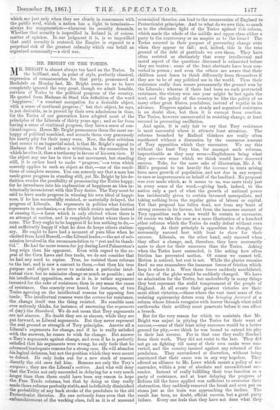TOPICS OF THE DAY.
A PERPETUAL SETTLEMENT FOR IRELAND. THE Tinzes is in great wrath with Mr. Hughes for ven- turing to suggest that the Permanent Settlement estab- lished seventy years ago in Bengal might be applied in principle to remove analogous difficulties in Ireland. It tells Mr. Hughes in almost so many words that he knows nothing about the matter • that the Settlement, so far from con- secrating tenant-right, abolished it ; that "the change in India aimed at the creation of a landlord class ; the proposed change in Ireland aims at the subversion of the landlord class, and would deprive them of all control *over the property which is now their own. The Permanent Settlement in Bengal left the cultivator of the land absolutely at the mercy of the Zemindar ; the proposed settlement in Ireland would leave the cultivator of the land absolutely his own master, subject to the payment of a fixed rent, which can in no case be increased." It is no part of our business to defend the Member for Lambeth, -who is quite able to take care of himself ; and Mr. Hughes, unless misreported, certainly did not make the best of his own strong case to his constituents. We do not suppose he in- tended to advocate a refusal of compensation to landlords ; but, so far as we can perceive, he forgot that most essential point in the proposition. We cannot, however, permit the • Times to " smash " by such arguments the only non-Revo- lutionary proposal broad enough, as we have urged for years. to give satisfaction to the cultivators of Ireland, that is, to three-fourths of the Irish population. The extract we have quoted from the Times is not merely inaccurate, it is the neatest conceivable statement of the exact converse of :the truth. Under the Perpetual Settlement of Bengal the land- lord gave up his rights to an indefinite increase of rent, and in -so doing secured to every tenant-in-chief and actual cultivator the fee simple in his share of the produce of the soil. Up to 1800 the State was sole landlord in Bengal, as it still is over half India, levying a rent which might be and was constantly varied in amount, from millions of cottier -tenants through certain tenants-in-chief or farmers-general '—it is still disputed which they were—called Zemindars. Lord Cornwallis, weary of a system which prevented all agri- cultural improvement, as it still prevents it in Orissa, extorted from the Court of Directors the great Act known as the Per- petual Settlement, under which the quota of produce to be paid by tenant-in-chief to Landlord and sub-tenant to tenant- in-chief was fixed for ever. No right in the world is superior to the tenant-right of the zemindar, except practically perhaps -that of the peasant-cultivator, the true " khood khast ' ryot, older than the Settlement. Each, so long as he pays his rent, is absolutely beyond reach of eviction except by armed violence, and as a matter of fact, never is evicted on any other pre- tence than non-payment. It is true, that under subsequent legislation and the pressure of competition for land, the pawer of the tenant-in-chief has greatly increased ; but still a peasant whose right is older than the Settlement is im- movable, and every new tenancy, unless stated in writing to be otherwise, is voidable only on account of this single failure. ven under Sir Barnes Peacock's great decision, which struck half the Indian lawyers as an almost legislative Act, the proportion of rental payable by sub-tenants cannot be increased ; but only the gross amount consequent on the rise in the values of Bengal produce, a rise settled by dis- -trict custom. Under this Act a class of tenants-in-chief has grown up who, by levying rents for wild lands, by successful attempts to levy illegal ceases, and by immense gains from new tenants have become almost nobles, and were recognized by Lord Canning as such, with hereditary claims to the functions of a true aristocracy ; on the other hand, the old peasantry have grown comparatively rich, so rich as to form a powerful though ignorant middle class ; Bengal has absorbed' some seventy millions of silver, now hoarded in every village, -and the peasantry helped, as far as unwarlike men could be expected to help, in cutting off mutineers. Political discon- tent has vanished, the State is the protector of the many against the few, not of the few against the many, and except in years of inundation or cyclone, Bengal is probably the one country in the world where hunger in its extreme form is un- known, where every man can and does keep his relations, and where the profit of agriculture justifies the borrowing of money at 75 per cent. Every man really labours for himself, and against that ceaseless industry even tropical nature, always hostile to man, struggles in vain. We are not anxious, however, to praise the Perpetual Settle- ment, for though we believe it is the key to the prosperity of Bengal, without which India would be untenable, it has still, like every other Indian institution, some evils of its own ; but we maintain that a similar principle applied upon an equal scale would change the mass of Irish cultivators from dis- contented cottiers into contented peasant proprietors, without destroying either the position or the property of the original landlords. Our proposal is that the State should buy from the landlords, at a price to be fixed by scientific calculation, the right of raising the rentals of their farms ; that, in fact, the landlords should sell their right of eviction, a right, we may remark, almost surrendered in Ulster. The tenant should then be offered this right in consideration of an additional payment of, say, five per cent., of which two per cent. should form a sinking fund for the repayment of the principal advanced by Government. He would then be placed in the exact position of the old peasant in Bengal,—that is, he would, subject to a quit-rent at quarter-day and to the rights of sub-tenants, be actual owner of the soil. All disputes about improvements, cultivations, votes, or other subjects would enci for ever, for the single claim of the landlord would be limited, as it is in Bengal, to the rent in cash on quarter-day.. Further, the tenant would be sure, sooner or later, to sublet his farm, the practice of which many friends of Irelandt express such apprehensions. Let him sublet as deep as he. likes or can, but every such sub-lease must be like his own, a, perpetual lease, voidable only if the rent is not paid to the hour. The one grand fear of purely agricultural tenants' that they may "lose their land," may, that is, be thrown out of work,. and turned out of their homes at one and the same moment, would then be ended ; each man would reap the full reward of his own industry, and each would be imbued with that first and strongest of Conservative impulses, the wish to protect his. own property from attack. At the same time, the landlord, enjoying his quit-rent and his demesne, would be the natural chief of the population round him, the greatest capitalist, the best educated resident, the man with the highest social position. So far from his property being confiscated, he would be guaranteed by the State alike in his present rental and his possible future profits ; would lose nothing, except indeed the power to drive his tenants to the poll, or to take- possession of improvements made with their cash. Just remember, for a moment, what the position of in average Irish tenant in the South now is. He holds, perhaps, fifteen acres of land, out of which he can extract by extreme industry an endurable living. At any moment, for any reason or no reason, for the owner's pleasure, or the owner's poverty, or the middleman's caprice, he may be ejected, that is, turned out of work and out of his home at once, a fate worse than that of a Warwickshire ironworker whose forge has been blown out. Where is he to go ? There are no manufactures, hired labour on the fields is still wretchedly cheap, the cities are swarming with the unemployed. He must either emigrate without money, or seek his fortune in England, where he knows no trade, or sink at once in his own village from an independent peasant into a half paid labourer, a social fall at least as great to him as to the most independent English middle-class man. Moreover, the very improvements he has himself effected, the cabin, the barn, the trench, the paling, are not his, but pass away to the next possessor. Who can wonder that the Irish peasant with such a risk perpetually before him becomes a discontented and suspicious man ; that he regards his landlord as the arbiter of his fate ; that he thinks the tenant who succeeds him has broken a social com- pact, and in his rage and disappointment shoots or threatens his, it may be quite innocent, rival, whose anxiety for land has made himself a pauper wanderer without a home ? Better, he thinks, pay, anything, better be mortgaged up to the lips, better submit to any sacrifice, than encounter such a destiny. Make the rent a quit-rent, even though at an increase of five per cent., and he is free at least of that prospect, liable to any fate except the one which in its complication of miseries so often crushes 'theChristianity out of him. But we shall be told that the right of eviction is the greatest of all the enjoyments of landed property, is the base and source of social position, and the owner ought not to be deprived of it, even with compensation, without his own consent. Will our adversaries consent to establish the law with the landlords' consent ? Even that would be an immense gain, for the best tenantry would drift instinctively towards the settled estates ; but we contend that the principle might justly be applied much further, that this enjoyment is one of those which are just only when they are clearly in consonance with the public weal, which a nation has a right to terminate— always for compensation—whenever its security demands. Whether that security is imperilled in Ireland is, of course, matter of opinion. In our judgment it is, is so imperilled that until security is restored, the Empire is exposed to a perpetual risk of the greatest calamity which can befall an organized community—a civil war.































 Previous page
Previous page